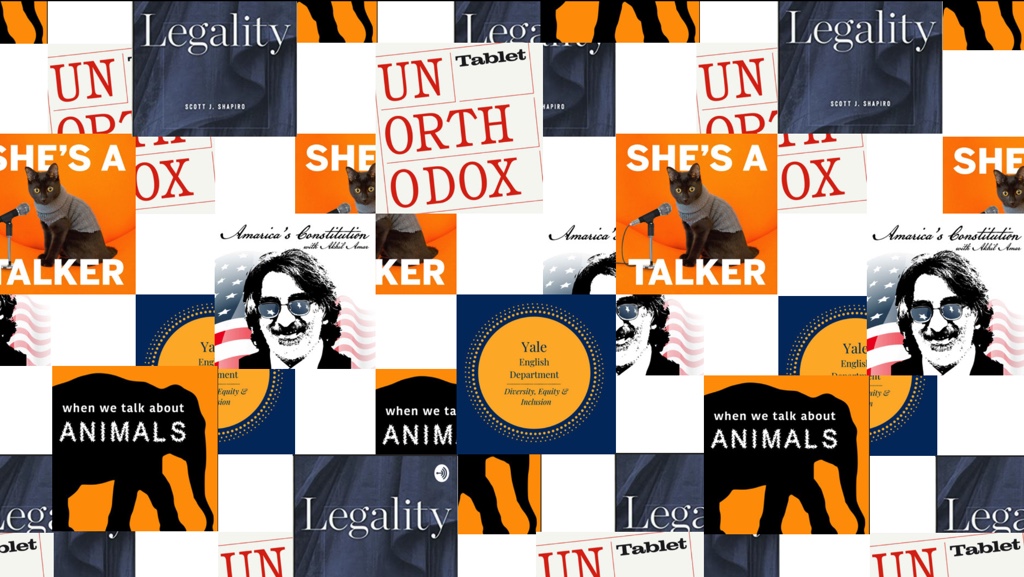ProfPods: The Faculty Voices of Yale, Recorded
More professors are podcasting than ever before, taking advantage of a new low-barrier medium to share their academic work and personal lives beyond the lecture hall.

On the day Yale shut down in March 2020, Scott Shapiro LAW ’90, professor of law and philosophy, was feeling restless. Cut off from his intellectual peers, he grabbed an iPad, began talking into it and, with a few clicks, fired his thoughts out onto the internet.
“I was trying to connect with people in a primitive kind of way, just talking about something I knew about,” he said. “But I wanted it to be fun, and I didn’t want to spend any time on it.”
And just like that, a podcast was born. Soon, more than two-thirds of the jurisprudence course Shapiro taught at Yale Law School was available for free to anyone who would listen. The 15-episode podcast — aptly named “Jurisprudence Course” — dives into legal theory, analogy and a recipe for Shapiro’s roast chicken dinner, all uploaded with entirely unedited audio.
“You can still hear the street noise,” he chuckled.
While not all faculty-hosted podcasts originate as spontaneously as Shapiro’s, they are some of the clearest windows into the minds of Yale’s expert scholars. In professors’ podcasts, their professional personas are peeled back to reveal raw, exposed conversation about their academic careers, daily lives, personal quirks and what they’re really thinking about when the office door is closed.
The News spoke to eight faculty members — with all but two currently in their first foray in podcasting — about what makes the medium so worthwhile, and how the recording studio and classroom intersect.
Sometimes, it turns out, they do not. Professor of English and journalist Mark Oppenheimer ’96 GRD ’03 finds little overlap between his journalism and the episodes of his series “Unorthodox.” Instead, the podcast brings out a part of his personal identity, “demystifying” what it means to be Jewish. Oppenheimer taught an undergraduate course titled “Advanced Podcasting” in 2015 and said he enjoys the in-the-moment nature of podcasting.
“You can run a conversation in print, and it can work, but there’s something special about hearing people talk to each other,” Oppenheimer said.
Podcasting can also be a chance to diversify and bring new academic voices to light. “The Common Room at Yale,” hosted by English professors Derek Green and Stephanie Newell alongside a panel of guest hosts, was established by the English Department’s Diversity, Equity and Inclusion committee. It often features younger voices or recent faculty additions to the department. With a wide variety of topical episodes, the two professors find themselves digging into their guests’ daily lives and asking about each guests’ favorite piece of art or music.
“We wanted it to be not academic, but a little bit nosy,” Newell said.
The Law School seems to be a particularly active hotbed for faculty podcasts, with at least five faculty members other than Shapiro currently hosting series. Akhil Amar ’80 LAW ’84, Sterling Professor of law and political science, recently began “Amarica’s Constitution,” which covers constitutional law events like the Texas abortion ban and Jan. 6 Capital riots. He and his slate of renowned guests, many of them Yale affiliates such as Bob Woodward ’65 and Neal Katyal LAW ’95, bring in about 5,000 listeners a week.
“I can’t tell you how many young people, current students, Yale applicants, come up to me or email me and say ‘Hey, I really enjoy the podcast!’” Amar said. “I truthfully don’t consume many other podcasts, but apparently this is a very important way of getting information out, I think, especially for younger generations.”
Viveca Morris ’15, MEM ’18, MBA ’19 and Jennifer Skene LAW ’14, who met each other as colleagues at the Law School, currently co-host “When We Talk About Animals.” Over the course of 43 episodes, the podcast has brought in expert guests to speak about everything from bioluminescence to seashells.
“It’s one thing to read about the social structure of a honeybee colony, but it’s another to hear from someone who’s dedicated their whole life to studying these animals actually talk about them,” Morris said.
“This is just an elaborate scheme for us to talk to really amazingly interesting people,” Skene joked.
Outside the law school, Yale School of Art critic Neil Goldberg concurred with this sentiment. He describes his series “She’s a Talker” as a great excuse to speak with people in the creative spaces of his home in downtown Manhattan — from the New Yorker’s Jia Tolentino to choreographer Michael Gutierrez. Podcasting, he added, makes professional work more accessible in fields that can often feel exclusive.
Indeed, all eight University faculty members the News spoke to have made their podcasts freely available.
“Who goes to museums and art galleries?” Goldberg said. “Who feels they have access to those spaces? A podcast is like sending a message in a bottle; you’re not directly in front of the audience, you’re just sending it out.”
Some faculty, including Morris and Skene, have opted to work with the Yale Broadcast Studio, the University’s video and audio production department. Producer Ryan McEvoy encouraged more professors, including those without podcasting experience, to start their own series with technical support provided by the studio.
“There are not that many professors doing it — we would like to see more faculty creating their own podcasts,” McEvoy told the News. “We’re trying to expand and make it more appealing to faculty.”
Whatever the production quality, many of the professors described podcasting as an innovative new form of scholarly communication.
“The big blockage for people listening to my ideas was that they had to get into Yale Law School first,” Shapiro said. “Now, they just need a phone.”
Podcasts were invented in 2004.







